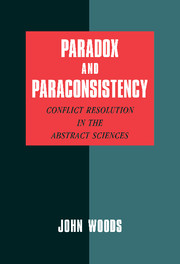5 - Sets and Truth
Published online by Cambridge University Press: 05 June 2012
Summary
… a sufficient, and at the same time general, criterion of truth cannot possibly be found.
Immanuel Kant, Critique of Pure Reason, 1781Indeed, even at this stage, I predict a time when there will be mathematical investigations of calculi containing contradictions, and people will actually be proud of having emancipated themselves from consistence.
Ludwig Wittgenstein, Philosophical Remarks, 1930THE DIALETHIC MINI-HISTORY OF SET THEORY
In the one hundred years since 1902, mathematicians have struggled to rehabilitate the theory of sets. There are plenty of versions: Zermelo-Frankel (ZF), ZF with Choice (ZFC), von Neumann-Bernays-Gödel (NBG), Kelley-Morse (KM), Math Logic (ML), New Foundations (NF), Set Theory and Its Logic (STL), and others. They are not equivalent, but each does roughly as well as any other in mimicking the integers. These modern theories are, so far as we can see, consistent and free of the Russell Paradox. Each is a development of the iterative conception of set and each is an articulation of the cumulative hierarchy. For all its post-Paradox centrality, the hierarchical approach to sets has attracted an ambush of its own in the dialethist's insistence that the approach is entirely mistaken. Here, then, is the Dialethist's Tale.
Once upon a time, people had a lovely and intuitive concept of sets with which to do the technical business of transfinite arithmetic. But in 1902, along came that trouble-maker Bertie Russell with his infamous Paradox, and our lovely intuitive concept was destroyed. What were the people to do? They needed sets to do modern mathematics. […]
- Type
- Chapter
- Information
- Paradox and ParaconsistencyConflict Resolution in the Abstract Sciences, pp. 155 - 195Publisher: Cambridge University PressPrint publication year: 2002



